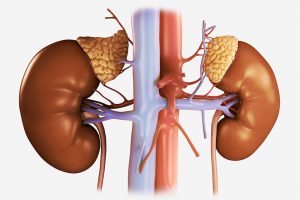Strong Link Between PPI Use and Kidney Disease
Data from 2 recent reports provide additional evidence of the link between proton pump inhibitor (PPI) use and chronic kidney disease (CKD), CKD progression, and 
end-stage renal disease (ERSD). It is an association that Eugene C. Kovalik, MD, says Duke Health nephrologists have recognized and responded to in recent years.
One of the reports, published in the January 2016 issue of JAMA Internal Medicine, reviewed PPI use among participants in the Atherosclerosis Risk in Communities study. The researchers concluded that PPI use is associated with a higher risk of CKD.
The second study was published in the April 2016 edition of the Journal of the American Society of Nephrology and was based on an analysis of a national database from the US Department of Veterans Affairs. The study authors used the database to build a primary cohort of new PPI users as well as new users of H2 blockers. After following renal outcomes in the study patients for more than 5 years, the authors concluded that PPI exposure is associated with increased risks of incident CKD, progression of CKD, and ESRD.
Kovalik notes that the risks of PPI use have taken years to come into focus, but the latest research provides needed clarity. “So many of our patients have multiple reasons for their kidney disease; it is often hard to judge over time which cause is the most significant.”
Many Duke kidney specialists have been asked by their patients about switching from PPIs to H2 blockers for long-term acid suppression. “We recommend using PPIs only for as long as they are indicated and no longer,” says Kovalik. “H2 blockers may be a better solution, but we advise patients to discuss that option with their gastrointestinal doctors if they require them for specific gastrointestinal issues.”
“H2 blockers have been used for more than 30 years with a pretty good safety profile,” Kovalik notes. “They are not as effective for certain acute or chronic conditions or issues, but, where appropriate, they can be used for long-term acid suppression.”